
エディプス・コンプレックス
Oedipus complex
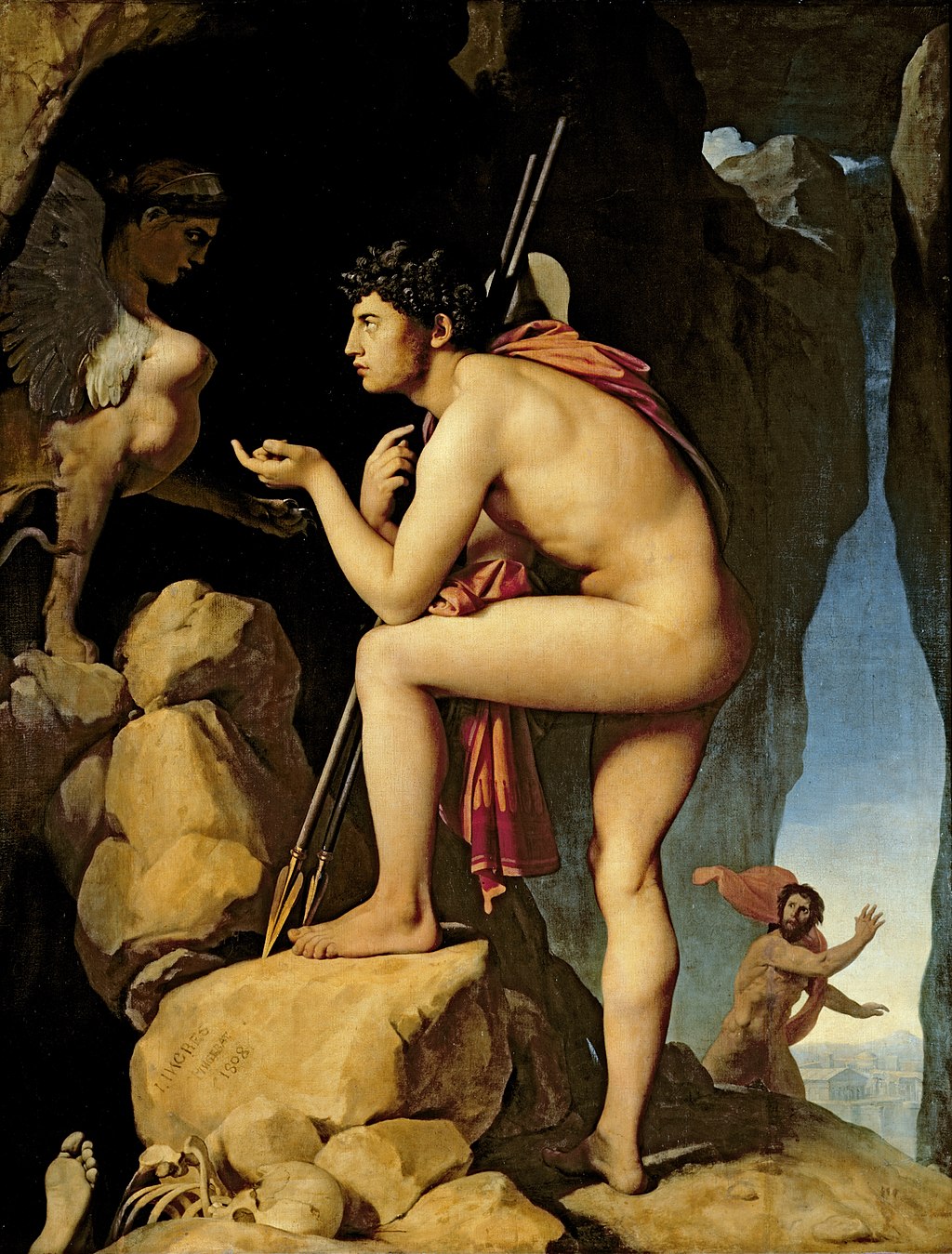
Oedipus describes the riddle of the Sphinx by Jean-Auguste-Dominique Ingres, c. 1805
オイディプス・コンプレックスあるいはエ ディプス・コンプレックスとは、古典的な精神分析理論では、エディプス・コンプレックス(エディプス・ コンプレックスとも表記される)は、息子の母親に対する性的態度と、それに付随する父親に対する敵意を指し、心理性発達の男根期に初めて形成される。一般 的な概念はジークムント・フロイトによって『夢の解釈』(1899年)の中で考察されたが、この言葉自体は後に同じくフロイトの論文『男性による対象選択 の特殊なタイプ』 (1910年)の中で紹介された。
★オイディプス(UK:
/ˈiːpəs/, US: /ːdɪ, ˈɛδίπους
「腫れた足」Oedipus)は、神話に登場するギリシャ神話のテーベの王である。ギリシャ神話における悲劇のヒーローであるオイディプスは、父親を殺し
て母親と結婚す るという予言を成就させ、それによって彼の都市と家族に災いをもたらした。
フロイトのこの理論あるいは仮説は、たんに精神分析のみならず、社会的なるもの(the social)の成り立ちを議論するために、20世紀を通してさまざまな論者が議論を重ねてきた。そのため、エディプス・コンプレックスは、なにか臨床治療におけるエロス性の解明というよりは、西洋世界がもつ(ということは 西洋世界秩序の非西洋世界への暴力的な介入を通した)精神の病理や、そのための克服すべきためのモデル=アーキタイプ(→アンチ・オイディプス)という側面をもっている。
『五月革命の記録』/サ
ン・パブロ(聖パウロ・使徒パウロ)
● Oedipus complex (エディプス・コンプレックス)
| In classical
psychoanalytic theory, the Oedipus
complex (also spelled Œdipus
complex) refers to a son's sexual attitude towards his mother and
concomitant hostility toward his father, first formed during the
phallic stage of psychosexual development. A daughter's attitude of
desire for her father and hostility toward her mother is referred to as
the feminine Oedipus complex.[1] The general concept was considered by
Sigmund Freud in The Interpretation of Dreams (1899), although the term
itself was introduced in his paper A Special Type of Choice of Object
made by Men (1910).[2][3] Freud's ideas of castration anxiety and penis envy refer to the differences of the sexes in their experience of the Oedipus complex.[4] The complex is thought to persist into adulthood as an unconscious psychic structure which can assist in social adaptation but also be the cause of neurosis. According to sexual difference, a positive Oedipus complex refers to the child's sexual desire for the opposite-sex parent and aversion to the same-sex parent, while a negative Oedipus complex refers to the desire for the same-sex parent and aversion to the opposite-sex parent.[3][5][6] Freud considered that the child's identification with the same-sex parent is the socially acceptable outcome of the complex. Failure to move on from the compulsion to satisfy a basic desire and to reconcile with the same-sex parent leads to neurosis. The theory is named for the mythological figure Oedipus, an ancient Theban King who discovers he has unknowingly murdered his father and married his mother, whose depiction in Sophocles' Oedipus Rex had a profound influence on Freud. Freud rejected the term Electra complex,[7] introduced by Carl Jung in 1913[8] as a proposed equivalent complex among young girls.[7] Some critics have argued that Freud, by abandoning his earlier seduction theory (which attributed neurosis to childhood sexual abuse) and replacing it with the theory of the Oedipus complex, instigated a cover-up for sexual abuse of children. Some scholars and psychologists have criticized the theory for being incapable of applying to same-sex parents, and as being incompatible with the widespread aversion to incest. |
古典的な精神分析理論では、エディプス・コンプレックス(エディプス・
コンプレックスとも表記される)は、息子の母親に対する性的態度と、それに付随する父親に対する敵意を指し、心理性発達の男根期に初めて形成される。一般
的な概念はジークムント・フロイトによって『夢の解釈』(1899年)の中で考察されたが、この言葉自体は彼の論文『男性による対象選択の特殊なタイプ』
(1910年)の中で紹介された[2][3]。 フロイトの去勢不安と陰茎羨望の考えはエディプス・コンプレックスの経験における男女の違いに言及している[4]. 性差によれば、正のエディプス・コンプレックスは、子どもが異性の親に性的欲求を抱き、同性の親に嫌悪感を抱くことを指し、負のエディプス・コンプレック スは、同性の親に欲求を抱き、異性の親に嫌悪感を抱くことを指す。基本的な欲求を満たそうとする強迫観念から抜け出せず、同性の親との和解に失敗すると神 経症になる。 この理論は、神話に登場するオイディプスにちなんで名づけられた。オイディプスは古代のテーバイ王で、知らず知らずのうちに父親を殺害し、母親と結婚して いたことに気づく。フロイトは、1913年[8]にカール・ユングが若い女の子の間で提案された同等のコンプレックスとして紹介したエレクトラ・コンプ レックスという言葉[7]を否定した。 一部の批評家は、フロイトが以前の誘惑理論(神経症を幼少期の性的虐待に帰結させる)を放棄し、エディプス・コンプレックスの理論に置き換えることによっ て、子どもへの性的虐待の隠蔽工作を扇動したと主張している。一部の学者や心理学者は、この理論は同性の親には適用できず、近親相姦を嫌悪する風潮とは相 容れないと批判している。 |
Background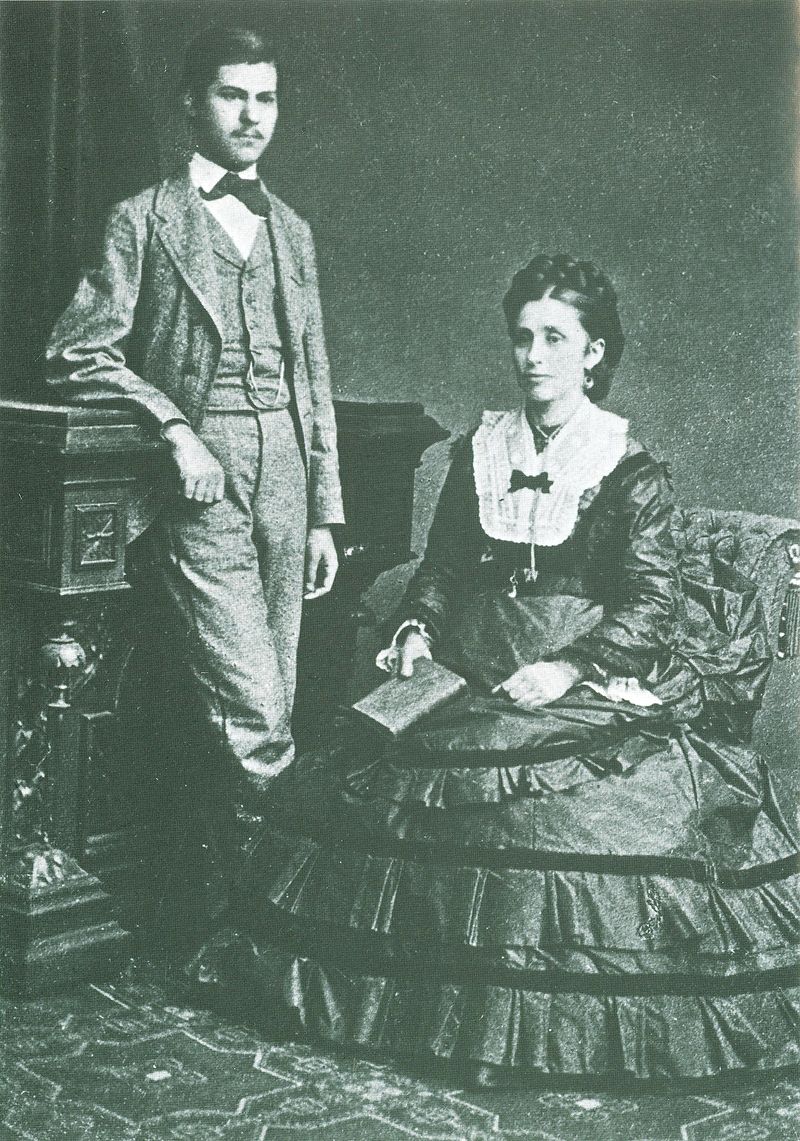 Sigmund Freud (age 16) with his mother in 1872[9] Oedipus refers to a 5th-century BC Greek mythological character Oedipus, who unwittingly kills his father, Laius, and marries his mother, Jocasta. A play based on the myth, Oedipus Rex, was written by Sophocles, c. 429 BC. Modern productions of Sophocles' play were staged in Paris and Vienna in the 19th century and were phenomenally successful in the 1880s and 1890s. The Austrian neurologist Sigmund Freud (1856–1939) attended. In his book The Interpretation of Dreams, first published in 1899, he proposes that an Oedipal desire is a universal psychological phenomenon innate (phylogenetic) to human beings, and the cause of much unconscious guilt. Freud believed that the Oedipal sentiment has been inherited through the millions of years it took for humans to evolve from apes.[10] His view of its universality was based on his clinical observation of neurotic or normal children, his analysis of his own response to Oedipus Rex, and on the fact that the play was effective on both ancient and modern audiences. Freud describes the Oedipus myth's timeless appeal thus: His destiny moves us only because it might have been ours — because the Oracle laid the same curse upon us before our birth as upon him. It is the fate of all of us, perhaps, to direct our first sexual impulse towards our mother and our first hatred and our first murderous wish against our father. Our dreams convince us that this is so.[11] Freud also claims that the play Hamlet "has its roots in the same soil as Oedipus Rex", and that the differences between the two plays are revealing: In [Oedipus Rex] the child's wishful fantasy that underlies it is brought into the open and realized as it would be in a dream. In Hamlet it remains repressed; and—just as in the case of a neurosis—we only learn of its existence from its inhibiting consequences.[12][13] However, in The Interpretation of Dreams, Freud makes it clear that the "primordial urges and fears" that are his concern and the basis of the Oedipal complex are inherent in the myths the play is based on, not primarily in the play itself, which Freud refers to as a "further modification of the legend" that originates in a "misconceived secondary revision of the material, which has sought to exploit it for theological purposes".[14][15][16] Before the idea of the Oedipus complex, Freud believed that childhood sexual trauma was the cause of neurosis. This idea, sometimes called Freud's seduction theory, was deemphasized in favor of the Oedipus complex around 1897.[17] Timeline 1896. Freud publishes The Aetiology of Hysteria. The paper was criticized for theorizing that hysteria is caused by sexual abuse. 1897–1909. After his father's death in 1896, and having seen the play Oedipus Rex, by Sophocles, Freud begins using the term "Oedipus". As Freud wrote in an 1897 letter, "I found in myself a constant love for my mother, and jealousy of my father. I now consider this to be a universal event in early childhood." 1909–1914. Proposes that Oedipal desire is the "nuclear complex" of all neuroses; first usage of "Oedipus complex" in 1910. 1914–1918. Considers paternal and maternal incest. 1919–1926. Complete Oedipus complex; identification and bisexuality are conceptually evident in later works. 1926–1931. Applies the Oedipal theory to religion and custom. 1931–1938. Investigates the "feminine Oedipus attitude" and "negative Oedipus complex"; later the "Electra complex".[18] |
バックグラウンド 1872年、ジークムント・フロイト(16歳)と母親[9]。 オイディプスとは紀元前5世紀のギリシア神話に登場するオイディプスのことで、彼は無意識のうちに父ライオスを殺し、母ヨカスタと結婚する。この神話に基 づく戯曲『オイディプス王』は、紀元前429年頃にソフォクレスによって書かれた。 ソフォクレスの戯曲の現代劇は19世紀にパリとウィーンで上演され、1880年代と1890年代には驚異的な成功を収めた。オーストリアの神経学者ジーク ムント・フロイト(1856-1939)も参加した。1899年に出版された彼の著書『夢の解釈』の中で、彼はエディプス願望が人間に生得的(系統的)に 備わった普遍的な心理現象であり、多くの無意識の罪悪感の原因であると提唱している。 フロイトは、エディプス的情念は、人類が類人猿から進化するのに要した数百万年の歳月を経て受け継がれてきたと考えた[10]。その普遍性についての彼の 見解は、神経症または正常な子供たちの臨床観察、『エディプス・レックス』に対する彼自身の反応の分析、そしてこの戯曲が古今東西の観客に効果的であった という事実に基づいていた。フロイトは、オイディプス神話の時代を超越した魅力をこう表現している: オイディプスの運命がわれわれを感動させるのは、それがわれわれの運命であったかもしれないからにほかならない。最初の性的衝動を母に向け、最初の憎悪と 最初の殺意を父に向けるのは、おそらく私たち全員の運命なのだ。私たちの夢は、そうであることを私たちに確信させる[11]。 フロイトはまた、ハムレット劇は「オイディプス王と同じ土壌に根を下ろしている」と主張し、2つの戯曲の違いを明らかにしている: オイディプス王』では、その根底にある子供の願望的な空想が、夢の中で実現されるように、公然と実現される。ハムレット』ではそれは抑圧されたままであ り、神経症の場合と同じように、私たちはその抑制的な結果からしかその存在を知ることができない[12][13]。 しかし、『夢の解釈』においてフロイトは、彼の関心事でありエディプス・コンプレックスの基礎である「根源的な衝動と恐怖」は、戯曲そのものではなく、戯 曲の基になっている神話に内在していることを明らかにしている。 エディプス・コンプレックスという考えが生まれる以前、フロイトは幼少期の性的トラウマが神経症の原因であると信じていた。この考えは、フロイトの誘惑理 論と呼ばれることもあるが、1897年頃にエディプス・コンプレックスを支持して重視されなくなった[17]。 年表 1896. フロイト、『ヒステリーの病因』を発表。この論文は、ヒステリーが性的虐待によって引き起こされるという理論であると批判された。 1897-1909. 1896年に父親が亡くなり、ソフォクレスの戯曲『オイディプス王』を見たフロイトは、「オイディプス」という言葉を使い始める。フロイトは1897年の 手紙の中で、「私は自分の中に、母への絶え間ない愛と父への嫉妬を見出した。私は今、これを幼児期における普遍的な出来事だと考えている。" 1909-1914. エディプス的欲望がすべての神経症の「核複合体」であると提唱。1910年に「エディプス・コンプレックス」を初めて使用。 1914-1918. 父方と母方の近親相姦を考察。 1919-1926. 完全なエディプス・コンプレックス;同一視と両性愛は後の作品で概念的に明らかになる。 1926-1931. エディプス理論を宗教や習慣に応用。 1931-1938. 女性的エディプスの態度」と「否定的エディプス・コンプレックス」、後に「エレクトラ・コンプレックス」を研究[18]。 |
| The Oedipus complex Original formulation Freud's original examples of the Oedipus complex are applied only to boys or men; he never fully clarified his views on the nature of the complex in girls.[19] He described the complex as a young boy's hatred or desire to eliminate his father and to have sex with his mother. Freud introduced the term "Oedipus complex" in a 1910 article titled A Special Type of Choice of Object made by Men.[19][2] It appears in a section of this paper describing what happens after a boy first becomes aware of prostitution: When after this he can no longer maintain the doubt which makes his parents an exception to the universal and odious norms of sexual activity, he tells himself with cynical logic that the difference between his mother and a whore is not after all so very great, since basically they do the same thing. The enlightening information he has received has in fact awakened the memory-traces of the impressions and wishes of his early infancy, and these have led to a reactivation in him of certain mental impulses. He begins to desire his mother herself in the sense with which he has recently become acquainted, and to hate his father anew as a rival who stands in the way of this wish; he comes, as we say, under the dominance of the Oedipus complex. He does not forgive his mother for having granted the favour of sexual intercourse not to himself but to his father, and he regards it as an act of unfaithfulness.[20] Freud and others eventually extended this idea and embedded it in a larger body of theory. Later theory 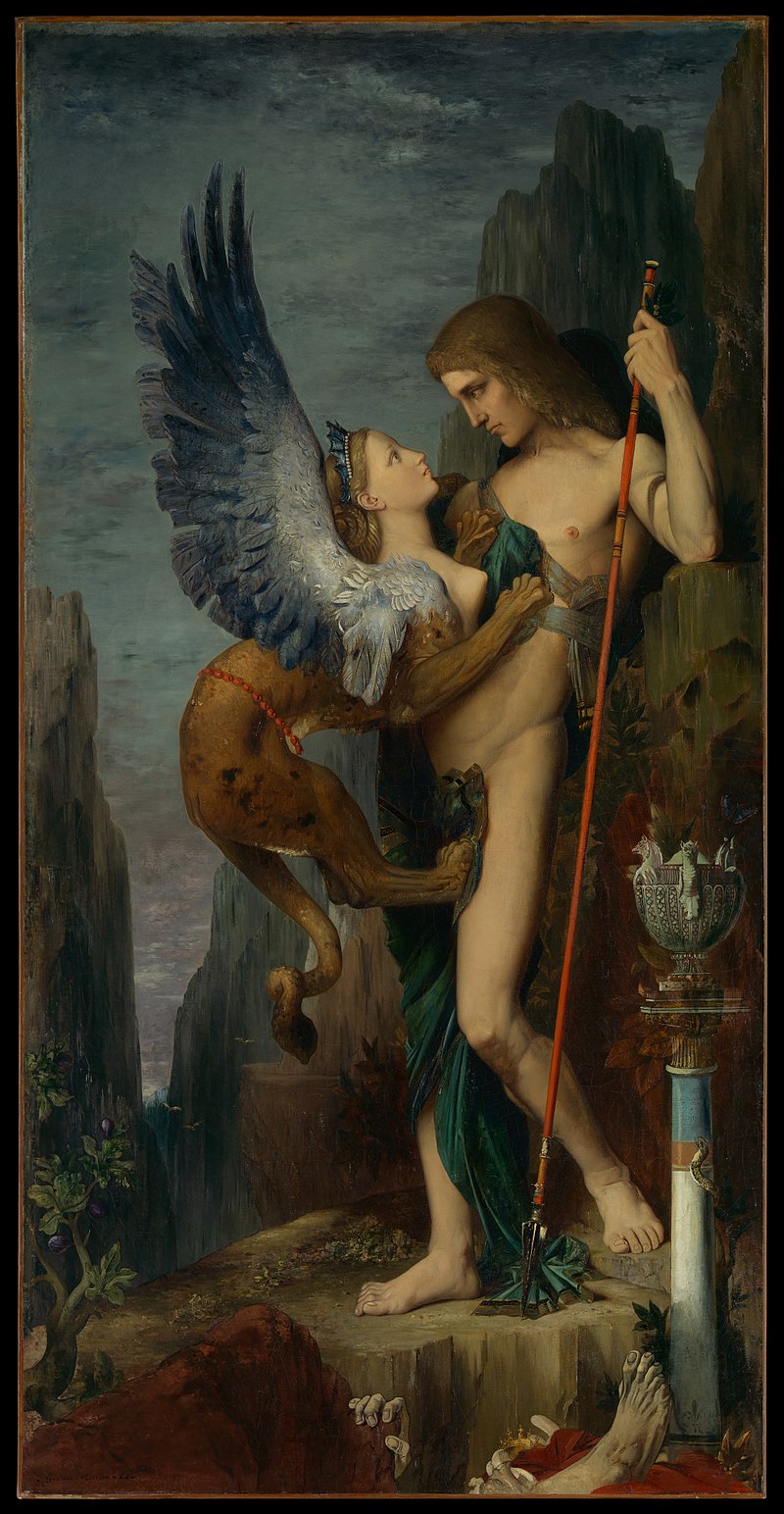 Oedipus and the Sphinx, by Gustave Moreau (1864) In classical psychoanalytic theory, the Oedipus complex occurs during the phallic stage of psychosexual development (age 3–6 years), although it can manifest at an earlier age.[21][22] In the phallic stage, a boy's decisive psychosexual experience is the Oedipus complex—his son–father competition for possession of his mother. It is in this third stage of psychosexual development that the child's genitalia is his or her primary erogenous zone; thus, when children become aware of their bodies, the bodies of other children, and the bodies of their parents, they gratify physical curiosity by undressing and exploring themselves, each other, and their genitals, so learning the anatomic differences between male and female and the gender differences between boy and girl. Despite the mother being the parent who primarily gratifies the child's desires, the child begins forming a discrete sexual identity—"boy", "girl"—that alters the dynamics of the parent and child relationship; the parents become objects of infantile libidinal energy. The boy directs his libido (sexual desire) toward his mother and directs jealousy and emotional rivalry against his father. The boy's desire for his mother is concomitant with a desire for the death of his father and even an impulse to instigate that death. These desires manifest in the realm of the id, governed by the pleasure principle, but the pragmatic ego, governed by the reality principle, knows that the father is an impossible rival to overcome and the impulse is repressed. The boy's ambivalence about his father's place in the family, is manifested as fear of castration by the physically superior father; the fear is an irrational, subconscious manifestation of the infantile id.[23] In both sexes, defense mechanisms provide transitory resolutions of the conflict between the drives of the id and the drives of the ego. Repression, the blocking of unacceptable ideas and impulses from the conscious mind, is the first defence mechanism, but its action does not resolve the id–ego conflict; it merely confines the impulse in the unconscious, where it continues to exert pressure in the direction of consciousness. The second defense mechanism is identification, in which the child adapts by incorporating, into his or her (super)ego, the personality characteristics of the same-sex parent. In the case of the boy, this diminishes his castration anxiety, because his likeness to his father protects him from the consequences of their rivalry. The little girl's anxiety is diminished in her identification with the mother, who understands that neither of them possesses a penis, and thus are not antagonists.[24] The satisfactory resolution of the Oedipus complex is considered important in developing the male infantile super-ego. By identifying with the father, the boy internalizes social morality, thereby potentially becoming a voluntary, self-regulating follower of societal rules, rather than merely reflexively complying out of fear of punishment. Unresolved son–father competition for the psychosexual possession of the mother might result in a phallic stage fixation that leads to the boy becoming an aggressive, over-ambitious, and vain man.[citation needed] Oedipal case study In Analysis of a Phobia in a Five-year-old Boy (1909), the case study of the equinophobic boy "Little Hans", Freud showed that the relation between Hans's fears—of horses and of his father—derived from external factors, the birth of a sister, and internal factors, the desire of the infantile id to replace his father as companion to his mother, and guilt for enjoying the masturbation normal to a boy of his age. Little Hans himself was unable to relate his fear of horses to his fear of his father. As the treating psychoanalyst, Freud noted that "Hans had to be told many things that he could not say himself" and that "he had to be presented with thoughts, which he had, so far, shown no signs of possessing".[25] Feminine Oedipus attitude Freud applied the Oedipus complex to the psychosexual development of boys and girls, but later modified the female aspects of the theory as "feminine Oedipus attitude" and "negative Oedipus complex".[26] His student–collaborator Carl Jung, in his 1913 work The Theory of Psychoanalysis, proposed the Electra complex to describe a girl's daughter–mother competition for psychosexual possession of the father.[8][27] In the phallic stage, the feminine Oedipus attitude is the little girl's decisive psychodynamic experience in forming a discrete sexual identity (ego). Whereas a boy develops castration anxiety, a girl develops penis envy, for she perceives that she has been castrated previously (and missing the penis), and so forms resentment towards her own kind as inferior, while simultaneously striving to claim her father's penis through bearing a male child of her own. Furthermore, after the phallic stage, the girl's psychosexual development includes transferring her primary erogenous zone from the infantile clitoris to the adult vagina.[28] Freud considered a girl's negative Oedipus complex to be more emotionally intense than that of a boy, resulting, potentially, in a woman of submissive, insecure personality.[29] |
エディプス・コンプレックス 当初の定式化 フロイトのエディプス・コンプレックスの最初の例は、少年または男性にのみ適用されるものであり、少女におけるコンプレックスの性質についての見解を完全 に明らかにすることはなかった[19]。 フロイトは、「エディプス・コンプレックス」という用語を、1910年に発表した「男性によってなされる対象の選択の特殊なタイプ」と題する論文の中で紹 介している[19][2]: この後、自分の両親を性行為の普遍的で忌まわしい規範の例外とする疑念を維持できなくなったとき、彼は皮肉な論理で、母親と売春婦の違いは、基本的には同 じことをしているのだから、結局のところそれほど大きくないのだと自分に言い聞かせる。啓蒙的な情報を得たことで、幼い頃の印象や願望の記憶が呼び覚まさ れ、ある種の精神的衝動が再活性化する。彼は、最近知ったような意味で母親自身を望み始め、この望みを邪魔するライバルとして父親をあらためて憎み始め る。彼は、性交の恩恵を自分ではなく父親に与えた母親を許さず、それを不誠実な行為とみなす[20]。 フロイトと他の人々は、最終的にこの考えを拡張し、より大きな理論の体系に組み込んだ。 後の理論  オイディプスとスフィンクス、ギュスターヴ・モロー作(1864年) 古典的な精神分析理論では、エディプス・コンプレックスは心理性発達の男根期(3~6歳)に起こるが、それ以前の年齢で現れることもある[21] [22]。 男根期において、少年の決定的な心理的経験はエディプス・コンプレックス-母親の所有権をめぐる息子と父親の競争-である。したがって、子どもは自分の身 体、他の子どもの身体、両親の身体を意識するようになると、服を脱いで自分自身や互いの身体、自分の性器を探索することで身体的好奇心を満たし、男性と女 性の解剖学的な違いや男の子と女の子の性差を学ぶ。 母親は主に子どもの欲望を満たす親であるにもかかわらず、子どもは「男の子」「女の子」という個別の性的アイデンティティを形成し始め、親子関係の力学が 変化する。少年はリビドー(性的欲望)を母親に向け、嫉妬と感情的対抗心を父親に向ける。少年の母親への欲望は、父親の死への欲望、さらにはその死を扇動 しようとする衝動と結びついている。これらの欲望は快楽原則に支配されたイドの領域に現れるが、現実原則に支配された現実的自我は、父親が克服不可能なラ イバルであることを知っており、衝動は抑圧される。家族における父親の地位に対する少年のアンビバレントは、肉体的に優れた父親による去勢への恐怖として 現れるが、この恐怖は幼児的イドの不合理で潜在意識的な現れである[23]。 男女ともに、防衛機制はイドの衝動と自我の衝動との間の葛藤を一過性に解決するものである。抑圧とは、受け入れがたい考えや衝動を意識から遮断することで あり、これが第一の防衛機制であるが、その作用はイドと自我の葛藤を解決するものではなく、単に衝動を無意識の中に閉じ込めるだけであり、そこで意識の方 向に圧力をかけ続けるだけである。第二の防衛機制は同一化であり、子供は同性の親の人格的特徴を自分の(超)自我に取り込むことによって適応する。男の子 の場合、父親と似ていることでライバル関係から身を守ることができるため、去勢不安は軽減される。少女の不安は、母親との同一化において軽減される。母親 は、二人ともペニスを所有しておらず、したがって敵対者ではないことを理解する[24]。 エディプス・コンプレックスの満足のいく解決は、男性の幼児期の超自我を発達させる上で重要であると考えられている。父親と同一化することで、少年は社会 的道徳を内面化し、それによって、単に罰を恐れて反射的に従うのではなく、自発的で自己調整的な社会的ルールの信奉者になる可能性がある。母親の心理的所 有権をめぐる未解決の息子と父親の競争は、男根期の固定化をもたらし、その結果、少年は攻撃的で、過剰な野心家で、うぬぼれの強い男になるかもしれない [要出典]。 エディプスの事例研究 馬恐怖症の少年「リトル・ハンス」の事例研究である『5歳児における恐怖症の分析』(1909年)において、フロイトは、ハンスの馬と父親に対する恐怖の 関係が、妹の誕生という外的要因と、母親の伴侶として父親に取って代わろうとする幼児的イドの欲望と、年頃の少年にとって普通の自慰行為を楽しむことへの 罪悪感という内的要因に由来することを示した。リトル・ハンス自身は、馬への恐怖と父親への恐怖を関連づけることができなかった。精神分析医であったフロ イトは、「ハンスは自分では言えないことをたくさん言われなければならなかった」「これまでのところ、彼が持っている兆候を見せなかった思考を提示されな ければならなかった」と述べている[25]。 女性的なエディプスの態度 フロイトはエディプス・コンプレックスを少年少女の精神性愛的発達に適用したが、後にこの理論の女性的側面を「女性的エディプス態度」や「否定的エディプ ス・コンプレックス」として修正した[26]。 彼の弟子であり共同研究者であったカール・ユングは、1913年の著作『精神分析論』の中で、父親の精神性愛的所有権をめぐる少女の娘と母親の競争を表現 するためにエレクトラ・コンプレックスを提唱した[8][27]。 男根期において、女性的なエディプスの態度は、個別の性的アイデンティティ(自我)を形成する上での少女の決定的な精神力動的経験である。男児が去勢不安 を発症するのに対し、女児は陰茎羨望を発症する。なぜなら、女児は自分が以前に去勢された(そして陰茎を失った)ことを認識するため、劣った同類に対する 憤りを形成すると同時に、自分の男児を産むことによって父親の陰茎を要求しようと努力するからである。さらに、男根期の後、少女の心理的な発達には、彼女 の主要なエロジゾーンを幼児期のクリトリスから大人の膣に移すことが含まれる[28]。 フロイトは、女児の負のエディプス・コンプレックスは男児のそれよりも感情的に強烈であり、その結果、従順で不安定な性格の女性になる可能性があると考え た[29]。 |
| Freudian theoretic revision Carl Gustav Jung 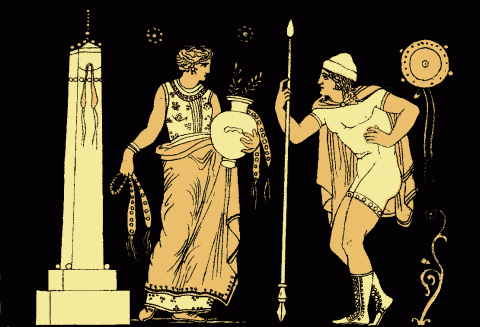 The Electra complex: the matricides Electra and Orestes. In response to Freud's proposal of the Oedipus complex, which was initially more focused on the little boy's experience of desire for the mother and jealous rivalry in relation of the father, student–collaborator Carl Jung proposed that girls experienced desire for the father and aggression towards the mother via what he called the Electra complex.[8] Electra was a Greek mythologic figure who plotted matricidal revenge with Orestes, her brother, against their mother Clytemnestra and their stepfather Aegisthus, for the murder of her father Agamemnon. Like Oedipus, the character is the subject of a play by Sophocles (Electra) from the 5th century BC.[30][31][32] Orthodox Jungian psychology uses the term "Oedipus complex" only to denote a boy's psychosexual development. Freud himself rejected the equivalence, arguing that at this stage of development it is only the male who experiences a simultaneous love for one parent and competitive hatred for the other. For Freud, the idea of the Electra complex assumes an analogous relation between boys and girls, in relation to their same and opposite sex parents, that does not actually exist. According to Freud, the Electra complex fails to take account of the differing effects of the castration complex, and the significance of the phallus, in the two sexes, and overlooks the girl's preoedipal attachment to the mother.[33] Otto Rank 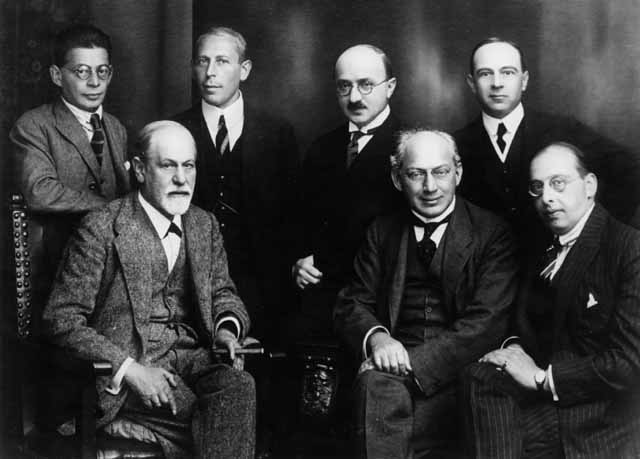 Otto Rank on the far left, behind Sigmund Freud, and other psychoanalysts (1922). In classical Freudian psychology the super-ego, "the heir to the Oedipus complex", is formed as the infant boy internalizes the familial rules of his father. In contrast, in the early 1920s, using the term "pre-Oedipal", Otto Rank proposed that a boy's powerful mother was the source of the super-ego, in the course of normal psychosexual development. Rank's theoretic conflict with Freud excluded him from the Freudian inner circle; nonetheless, he later developed the psychodynamic Object relations theory in 1925. Melanie Klein Whereas Freud proposed that the father (the paternal phallus) was central to infantile and adult psychosexual development, Melanie Klein concentrated on the early maternal relationship, proposing that Oedipal manifestations are perceptible in the first year of life, the oral stage. Her proposal was part of the "controversial discussions" (1942–44) at the British Psychoanalytical Association. The Kleinian psychologists proposed that "underlying the Oedipus complex, as Freud described it ... there is an earlier layer of more primitive relationships with the Oedipal couple".[34] She assigned "dangerous destructive tendencies not just to the father but also to the mother in her discussion of the child's projective fantasies".[35] Klein's concept of the depressive position, resulting from the infant's ambivalence toward the mother, lessened the central importance of the Oedipus complex in psychosexual development.[36][37] Wilfred Bion "For the post-Kleinian Bion, the myth of Oedipus concerns investigatory curiosity—the quest for knowledge—rather than sexual difference; the other main character in the Oedipal drama becomes Tiresias (the false hypothesis erected against anxiety about a new theory)".[38] As a result, "Bion regarded the central crime of Oedipus as his insistence on knowing the truth at all costs".[39] Jacques Lacan Jacques Lacan argued against removing the Oedipus complex from the center of psychosexual developmental experience. For him, the Oedipus complex "—in so far as we continue to recognize it as covering the whole field of our experience with its signification—may be said to mark the limits that our discipline assigns to subjectivity".[40] It is that which superimposes the kingdom of culture upon the person, marking his or her introduction to the symbolic order. Thus "a child learns what power independent of itself is as it goes through the Oedipus complex ... encountering the existence of a symbolic system independent of itself".[41] Moreover, Lacan's proposal that "the ternary relation of the Oedipus complex" liberates the "prisoner of the dual relationship" of the son–mother relationship proved useful to later psychoanalysts;[42] thus, for Bollas, the "achievement" of the Oedipus complex is that the "child comes to understand something about the oddity of possessing one's own mind ... discovers the multiplicity of points of view".[43] Likewise, for Ronald Britton, "if the link between the parents perceived in love and hate can be tolerated in the child's mind ... this provides us with a capacity for seeing us in interaction with others, and ... for reflecting on ourselves, whilst being ourselves".[44] As such, in The Dove that Returns, the Dove that Vanishes (2000), Michael Parsons proposed that such a perspective permits viewing "the Oedipus complex as a life-long developmental challenge ... [with] new kinds of Oedipal configurations that belong to later life".[45] In 1920, Sigmund Freud wrote that "with the progress of psychoanalytic studies the importance of the Oedipus complex has become, more and more, clearly evident; its recognition has become the shibboleth that distinguishes the adherents of psychoanalysis from its opponents";[46] thereby it remained a theoretic cornerstone of psychoanalysis until about 1930, when psychoanalysts began investigating the pre-Oedipal son–mother relationship within the theory of psychosexual development.[47][48] Janet Malcolm reports that by the late 20th century, to the object relations psychology "avant-garde, the events of the Oedipal period are pallid and inconsequential, in comparison with the cliff-hanging psychodramas of infancy. ... For Kohut, as for Winnicott and Balint, the Oedipus complex is an irrelevance in the treatment of severe pathology".[49] Nonetheless, ego psychology continued to maintain that "the Oedipal period—roughly three-and-a-half to six years—is like Lorenz standing in front of the chick, it is the most formative, significant, moulding experience of human life ... If you take a person's adult life—his love, his work, his hobbies, his ambitions—they all point back to the Oedipus complex".[50] |
フロイトの理論修正 カール・グスタフ・ユング  エレクトラ・コンプレックス:マトリキデスのエレクトラとオレステス。 フロイトのエディプス・コンプレックスの提唱は、当初は少年の母親に対する欲望と父親に対する嫉妬のライバル意識に焦点を当てたものであったが、それに対 して、学生時代の共同研究者であったカール・ユングは、少女は父親に対する欲望と母親に対する攻撃性を、彼がエレクトラ・コンプレックスと呼ぶものによっ て経験すると提唱した[8]。 [8] エレクトラはギリシア神話に登場する人物で、父アガメムノンを殺した母クリュテムネストラと継父アイギストスに対して、弟オレステスとともに母殺しの復讐 を企てた。オイディプスと同様、紀元前5世紀のソフォクレスの戯曲(エレクトラ)の題材となっている[30][31][32]。正統的なユング心理学で は、「オイディプス・コンプレックス」という用語は少年の精神性愛の発達を示すためにのみ用いられる。フロイト自身はこの等価性を否定し、この発達段階で は、一方の親への愛と他方の親への競争的憎悪を同時に経験するのは男性だけであると主張した。フロイトにとって、エレクトラ・コンプレックスという考え方 は、少年少女が同性の親と異性の親との関係において、実際には存在しない類似の関係を想定している。フロイトによれば、エレクトラ・コンプレックスは、両 性における去勢コンプレックスの異なる影響とファルスの重要性を考慮しておらず、少女の母親に対する前エディプス的な愛着を見落としている[33]。 オットー・ランク  ジークムント・フロイトと他の精神分析家の後ろの最左翼にいるオットー・ランク(1922年)。 古典的なフロイト心理学では、「エディプス・コンプレックスの継承者」である超自我は、幼児期の少年が父親の家族的ルールを内面化することで形成される。 これとは対照的に、1920年代初頭、オットー・ランクは「プレ・エディプス」という言葉を用いて、正常な心理性発達の過程において、少年の力強い母親が 超自我の源であると提唱した。ランクはフロイトと理論的に対立していたため、フロイトの側近からは除外されたが、それにもかかわらず、後に1925年に精 神力動的な対象関係論を発展させた。 メラニー・クライン フロイトが父親(父性ファルス)が幼児期および成人の心理性発達の中心であると提唱したのに対し、メラニー・クラインは初期の母性関係に焦点を当て、エ ディプスの顕在化は生後1年の口唇期に知覚されると提唱した。彼女の提案は、英国精神分析協会における「論争的な議論」(1942~44年)の一部となっ た。クライン派の心理学者たちは、「フロイトが説明したようなエディプス・コンプレックスの根底には......エディプス夫婦とのより原始的な関係のよ り早い層がある」と提案した[34]。彼女は、「子どもの投影的空想についての議論の中で、危険な破壊的傾向を父親だけでなく母親にも」割り当てた。 [35] 幼児の母親に対するアンビバレンスから生じる抑うつ的な立場のクラインの概念は、心理性発達におけるエディプス・コンプレックスの中心的な重要性を弱めて いた[36][37]。 ウィルフレッド・ビオン 「ポスト・クライン派のビオンにとって、オイディプスの神話は性的差異よりもむしろ調査好奇心-知識の探求-に関わるものであり、オイディプス劇のもう一 人の主人公はティレジアス(新しい理論に対する不安に対して立てられた誤った仮説)になる」[38]。その結果、「ビオンはオイディプスの中心的な罪を、 どんな犠牲を払っても真実を知ろうとする彼の主張とみなした」[39]。 ジャック・ラカン ジャック・ラカンは、エディプス・コンプレックスを心理性発達体験の中 心から外すことに反対していた。彼にとってエディプス・コンプレックスは、「私たち がその意味づけによって私たちの経験の全領域を覆っていると認識し続ける限りにおいて、私たちの学問が主観性に与える限界を示すものであると言うことがで きる」[40]。 こうして「子どもはエディプス・コンプレックスを経て、自分自身から独 立した力が何であるかを学ぶ......自分自身から独立した象徴体系の存在に遭遇 する」。 [さらに、「エディプス・コンプレックスの三項関係」が息子と母親の関係という「二重関係の囚人」を解放するというラカンの提案は、後の精神分析家たちに とって有用であることが証明された。 同様に、ロナルド・ブリトンにとって、「もし愛と憎しみにおいて認識される両親の結びつきが子どもの心の中で許容されるのであれば、......このこと は、他者との相互作用の中で自分自身を見る能力と、......自分自身を省察する能力を与えてくれる」[43]。 そのため、マイケル・パーソンズは『帰ってくる鳩、消える鳩』(2000年)の中で、このような視点は「エディプス・コンプレックスを生涯にわたる発達上 の課題として捉える」ことを可能にすると提唱している。[その後の人生に属する新たな種類のエディプスの構成とともに」[45]。 1920年、ジークムント・フロイトは「精神分析研究の進歩とともに、 エディプス・コンプレックスの重要性はますます明らかになり、その認識は精神分析の 信奉者をその反対者から区別する禁句となった」と書いている[46]。 [47] [48] ジャネット・マルコムは、20世紀後半になると、対象関係心理学の「アヴァンギャルド」たちにとって、エディプス期の出来事は、幼児期の崖っぷちに立たさ れた心理劇に比べれば、淡白で取るに足らないものであったと報告している。... それにもかかわらず、自我心理学は、「エディプス期(およそ3年半から6年)は、ローレンツがひよこの前に立っているようなものであり、人間の人生の中で 最も形成的で、重要で、形成的な経験である」[49]と主張し続けた。人の成人後の人生-恋愛、仕事、趣味、野心-を考えてみると、それらはすべてエディ プス・コンプレックスに行き着く」[50]。 |
| Criticism Lack of empirical basis Studies conducted of children's attitudes to parents at the oedipal stage do not demonstrate the shifts in positive feelings that are predicted by the theory.[51] Case studies that Freud relied upon, such as the case of Little Hans, could not be verified through research or experimentation on a larger population.[52] Adolf Grünbaum argues that the type of evidence Freud and his followers used, the clinical productions of patients during analytic treatment, by their nature cannot provide cogent observational support for Freud's core hypotheses.[53] Evolutionary psychologists Martin Daly and Margo Wilson, in their 1988 book Homicide, argue that the Oedipus complex theory yields few testable predictions. They find no evidence of the Oedipus complex in people. There is evidence of parent–child conflict but it is not for sexual possession of the opposite sex-parent.[54] According to psychiatrist Jeffrey Lieberman, Freud and his followers resisted subjecting his theories, including the Oedipus theory, to scientific testing and verification.[55] Lieberman claims that investigations based in cognitive psychology either contradict or fail to support Freud's ideas.[55] Cover for sexual abuse In the 1970s, social worker Florence Rush wrote that Freud's seduction theory, which came early in his career, correctly attributed his patients' memories of childhood trauma to the patient's family, often the father, implying that widespread sexual abuse of children by parents was common in his society. According to Rush, the discovery of this abuse made Freud uncomfortable, so he abandoned the theory and invented the Oedipus complex to replace it. The Oedipus complex allowed him to attribute stories of childhood sexual abuse to the children themselves. Freud came to the conclusion that the stories were fantasies of hidden desires, rather than factual descriptions of trauma. Thus, Rush argues, Freud covered up illegal and immoral sexual abuse by undermining the perceptions of his patients, particularly his female patients.[56] Rush's theory became known as The Freudian Coverup. A director of the Sigmund Freud Archives, Jeffrey Moussaieff Masson, adopted the view that Freud's work was a cover-up for abuse after reading Freud's unpublished letters. In his book The Assault on Truth, Masson argues that Freud misattributed accounts of sexual abuse to fabrications and fantasies of children because, for personal reasons, he was unable to accept that the accounts were real. According to Masson, among Freud's reasons to suppress the abuse was that he did not want to be confronted by the father of a patient who was accused of committing abuse. Late in his career Freud sought to prevent colleague Sandor Ferenczi from delivering a paper that reasserted the seduction theory. Freud had hoped that his former student would abandon the theory as he himself had done, but Ferenczi delivered the paper in 1932.[57] Masson writes that, because the theory of the Oedipus complex became widely popular, psychoanalysts continue to do damage to their patients by doubting the reality of the patient's early memories of trauma. Other Freud scholars argue that Masson and Rush have misrepresented the reasons and intention behind Freud's abandonment of the seduction theory and adoption of the theory of the Oedipus complex. According to Dr. Kurt R. Eissler, who replaced Masson as director of the Freud Archives, Freud did not in any sense reject the reality of childhood sexual trauma, but realized that actual abuse was not the universal cause of neurosis he had thought it to be.[57] New York psychiatrist Dr. Frank R. Hartmann said that "Freud realized he made a mistake in attributing all neurosis to repressed memories of actual abuse. He discovered a much broader theory which explained much more."[57] The historian Peter Gay, author of Freud: A Life for Our Time (1988), emphasizes that Freud continued to believe that some patients were sexually abused, but realized that there can be a difficulty in distinguishing between truth and fiction. Therefore, according to Gay, there was no sinister motive in changing his theory; Freud was a scientist seeking the facts and was entitled to change his views if new evidence was presented to him.[58] Gender role assumptions Many scholars and psychologists observe that, because the theory of the Oedipus complex assigns distinct roles to a mother and father, it is a poor fit for families that do not use traditional gender roles.  The Oedipus complex has been criticized for disregarding nontraditional family structures such as families with parents of the same sex. As of November 2022 same-sex marriage is legal in 31 nations.[59] Same-sex couples start families through adoption or surrogacy. The pillars of the family structure are diversifying to include parents who are single or of the same sex as their partner along with the traditional heterosexual, married parents. These new family structures pose new questions for the psychoanalytic theories such as the Oedipus complex that require the presence of the mother and the father in the successful development of a child.[35] Evidence suggests children who have been raised by parents of the same sex are not much different from children raised in a traditional family structure.[35] The classic theory of the Oedipal drama has fallen out of favor in today's society, according to a study by Drescher, having been criticized for its "negative implications" towards same sex parents.[35] Many psychoanalytic thinkers such as Chodorow and Corbett are working towards changing the Oedipus complex to eliminate "automatic associations among sex, gender, and the stereotypical psychological functions deriving from these categories" and make it applicable to today's modern society.[35] From its Freudian conception, psychoanalysis and its theories have always relied on traditional gender roles to draw itself out. In the 1950s, psychologists distinguished different roles in parenting for the mother and father. The role of primary caregiver is assigned to the mother. Motherly love was considered to be unconditional. While the father is assigned the role of secondary caregiver, fatherly love is conditional, responsive to the child's tangible achievements.[35] The Oedipus complex is compromised in the context of modern family structures, as it requires the existence of the notions of masculinity and femininity.[60] When there is no father present there is no reason for a boy to have castration anxiety and thus resolve the complex.[35] Psychoanalysis presents non-heteronormative relationships a sort of perversion or fetish rather than a natural occurrence.[60] To some psychologists, this emphasis on gender norms can be a distraction in treating homosexual patients.[60] The 1972 book Anti-Oedipus by Gilles Deleuze and Félix Guattari is "a critique of psychoanalytic normativity and Oedipus" according to Didier Eribon.[61] Eribon criticizes the Oedipus complex described by Freud or Lacan as an "implausible ideological construct" which is an "inferiorization process of homosexuality".[62] According to psychologist Geva Shenkman, "To examine the application of concepts such as Oedipus complex and primal scene to male same-sex families, we must first eliminate the automatic associations among sex, gender, and the stereotypical psychological functions based on these categories."[35] Postmodern psychoanalytic theories, which aim to reestablish psychoanalysis for modern times, suggest modifying or discarding the complex because it does not describe newer family structures. Shenkman suggests that a loose interpretation of the Oedipus complex in which the child seeks sexual satisfaction from any parent regardless of gender or sex, would be helpful: "From this perspective, any parental authority, or institution for that matter, may represent the taboo that gives rise to the complex". Psychoanalyst Melanie Klein proposed a theory which broke gender stereotypes but still kept traditional father-mother family structure. She assigned "dangerous destructive tendencies not just to the father but also to the mother in her discussion of the child's projective fantasies".[35] Stretched theory Anouchka Grose understands the Oedipus complex as "a way of explaining how human beings are socialised ... learning to deal with disappointment".[63] Her summary of the complex is "You have to stop trying to be everything for your primary carer, and get on with being something for the rest of the world".[64] This post-Lacanian interpretation of the complex diverges considerably from its description in 19th century. Eribon writes that it "stretches the Oedipus complex to a point where it almost doesn't look like Freud's any more".[62] Aversion to incest Parent-child and sibling-sibling incestuous unions are almost universally forbidden.[65] An explanation for this incest taboo is that rather than instinctual sexual desire, there is instinctual sexual aversion against these unions (See Westermarck effect). Steven Pinker wrote that "The idea that boys want to sleep with their mothers strikes most men as the silliest thing they have ever heard. Obviously, it did not seem so to Freud, who wrote that as a boy he once had an erotic reaction to watching his mother dressing. Of note is that Amalia Nathansohn Freud was relatively young during Freud's childhood and thus of reproductive age, and Freud having a wet-nurse, may not have experienced the early intimacy that would have tipped off his perceptual system that Mrs. Freud was his mother."[66] Historical mystique - Ethnocentrism Bourdieu In Esquisse pour une autoanalyse, Pierre Bourdieu argues that the success of the concept of Oedipus is inseparable from the prestige associated with ancient Greek culture and the relations of domination that are reinforced in the use of this myth. In other words, if Oedipus was Bantu or Baoulé, his story would probably not be viewed as a human universal. This remark recalls the historically and socially situated character of the founder of psychoanalysis.[67] Malinowski Sex and Repression in Savage Society is considered "a famous critique of psychoanalysis, arguing that the 'Oedipus complex' described by Freud is not universal."[68] Sexism Feminist views on the Oedipus complex include criticism of the phallocentrism of the theory by philosopher Luce Irigaray among others. Irigaray charges that Freud's work assumes a masculine perspective, epitomized by the centrality of the penis (or lack of a penis for girls) in the Oedipus complex. She thinks that Freud's desire for a neat, symmetrical theory leads him to a contrived understanding of women as inverse men. She charges that he does not explore mother–daughter relationships and that he dogmatically assumes female sexuality will be a perfect mirror of male sexuality.[69] |
批判 経験的根拠の欠如 エディプス期における子どもの親に対する態度について実施された研究は、理論によって予測される肯定的な感情の変化を実証していない[51]。 フロイトが依拠した事例研究、例えばリトル・ハンスの事例は、より大規模な集団に対する研究や実験によって検証することができなかった[52]。 アドルフ・グリュンバウムは、フロイトと彼の支持者たちが用いた証拠の種類、つまり分析治療中の患者の臨床的な産出物は、その性質上、フロイトの中核的な 仮説に対する説得力のある観察的な裏付けを提供することはできないと論じている[53]。 進化心理学者のマーティン・デイリーとマーゴ・ウィルソンは、1988年の著書『殺人』の中で、エディプス・コンプレックス理論はほとんど検証可能な予測 をもたらさないと論じている。彼らは人間にエディプス・コンプレックスが存在する証拠を発見していない。親子の葛藤の証拠はあるが、それは異性である親の 性的所有のためではない。 精神科医のジェフリー・リーバーマンによれば、フロイトとその信奉者たちは、エディプス理論を含む彼の理論を科学的なテストと検証に供することに抵抗した [55]。リーバーマンは、認知心理学に基づく調査はフロイトの考えを矛盾させるか、支持できないと主張している[55]。 性的虐待の隠蔽 1970年代、ソーシャルワーカーのフローレンス・ラッシュは、フロイトがそのキャリアの初期に提唱した誘惑理論は、患者の幼少期のトラウマの記憶を患者 の家族、多くの場合は父親に正しく帰結させ、親による子どもへの広範な性的虐待が彼の社会では一般的であったことを暗示していると書いた。ラッシュ曰く、 この虐待の発見はフロイトを不快にさせたため、彼はこの理論を放棄し、それに代わるものとしてエディプス・コンプレックスを発明した。エディプス・コンプ レックスによって、彼は幼少期の性的虐待の話を子どもたち自身に帰結させることができた。フロイトは、その話はトラウマの事実を描写したものではなく、隠 された欲望の空想であるという結論に達した。こうしてラッシュは、フロイトは患者、特に女性患者の認識を弱めることによって、違法で不道徳な性的虐待を隠 蔽したと主張する。 ジークムント・フロイト・アーカイヴの所長であるジェフリー・ムーサイフ・マソンは、フロイトの未発表の書簡を読んだ後、フロイトの仕事は虐待の隠蔽で あったという見解を採用した。マッソンは著書『真実への攻撃』の中で、フロイトは個人的な理由から、性的虐待の証言が現実のものであることを受け入れるこ とができなかったため、子どもの捏造や空想であると誤認したと主張している。マッソンによれば、フロイトが虐待を抑圧した理由のひとつは、虐待を行ったと 告発された患者の父親に直面されたくなかったからだという。フロイトはキャリアの後半で、同僚のサンドル・フェレンツィが誘惑理論を再び主張する論文を発 表するのを阻止しようとした。マッソンは、エディプス・コンプレックスの理論が広く普及したために、精神分析医は患者の初期のトラウマの記憶の現実性を疑 うことによって、患者にダメージを与え続けていると書いている。 他のフロイト研究者は、マッソンとラッシュは、フロイトが誘惑理論を放棄し、エディプス・コンプレックス理論を採用した理由と意図を誤って伝えていると主 張している。マッソンの後任としてフロイト文書館の館長を務めたカート・R・アイスラー博士によれば、フロイトは幼少期の性的トラウマの現実を否定したわ けではなく、実際の虐待が、彼が考えていたような神経症の普遍的な原因ではないことに気づいたのである[57]。 ニューヨークの精神科医フランク・R・ハートマン博士は、「フロイトは、すべての神経症を実際の虐待の抑圧された記憶に帰するのは間違いだと気づいた。彼 は、より多くのことを説明する、より広範な理論を発見した」[57]: A Life for Our Time』(1988年)の著者である歴史家のピーター・ゲイは、フロイトは一部の患者が性的虐待を受けていると信じ続けていたが、真実と虚構を区別する ことが困難であることに気づいていたと強調している。したがって、ゲイによれば、自分の理論を変えることに不吉な動機はなく、フロイトは事実を追求する科 学者であり、新たな証拠が提示されれば自分の見解を変える権利があったのである[58]。 性役割の仮定 多くの学者や心理学者は、エディプス・コンプレックスの理論が母親と父親に明確な役割を割り当てているため、伝統的な性別役割分担を用いない家庭にはそぐ わないとしている。  エディプス・コンプレックスは、同性の両親を持つ家族のような非伝統的な家族構造を無視していると批判されてきた。 2022年11月現在、同性婚は31カ国で合法化されている[59]。同性カップルは養子縁組や代理出産によって家族をつくる。家族構造の柱は多様化し、 伝統的な異性婚の親に加え、独身やパートナーと同性の親も含まれるようになっている。このような新しい家族構造は、エディプス・コンプレックスのような精 神分析理論に新たな問題を提起している。 ドレシャーの研究によれば、古典的なエディプスのドラマの理論は、同性の親に対する「否定的な意味合い」から批判され、現代社会では支持されなくなってい る[35]。 [35] チョードロウやコルベットのような多くの精神分析思想家は、エディプス・コンプレックスを変化させ、「性、ジェンダー、そしてこれらのカテゴリーから派生 するステレオタイプ的な心理的機能の間の自動的な連想」を排除し、今日の現代社会に適用できるようにすることを目指している[35]。 フロイトの構想から、精神分析とその理論は常に伝統的なジェンダー的役割に依存してきた。 1950年代、心理学者は母親と父親の子育てにおける異なる役割を区別した。主たる養育者の役割は母親に割り当てられた。母親の愛は無条件であると考えら れた。エディプス・コンプレックスは、男性性と女性性という概念の存在を必要とするため、現代の家族構造の文脈では危うい。 [精神分析は、非異常規範的な関係を自然な出来事ではなく、一種の倒錯やフェティッシュとして提示する[60]。 一部の心理学者にとって、このジェンダー規範の強調は同性愛患者の治療において注意散漫になる可能性がある[60]。 ジル・ドゥルーズとフェリックス・ガタリによる1972年の著書『アンチ・オイディプス』は、ディディエ・エリボンによれば「精神分析的規範性とオイディ プスに対する批判」である[61]。エリボンは、フロイトやラカンによって記述されたオイディプス・コンプレックスを「同性愛の劣等化プロセス」である 「ありえないイデオロギー的構築物」として批判している。 [62] 心理学者のゲヴァ・シェンクマンによれば、「エディプス・コンプレックスや原初的場面といった概念の男性同性家族への適用を検討するためには、まず、性、 ジェンダー、そしてこれらのカテゴリーに基づくステレオタイプ的な心理的機能の間の自動的な連想を排除しなければならない」[35]。 ポストモダンの精神分析理論は、精神分析を現代向けに再構築することを目的としており、コンプレックスは新しい家族構造を記述していないため、修正または 破棄することを提案している。シェンクマンは、エディプス・コンプレックスの緩やかな解釈として、子どもが性別や性別を問わず、どの親にも性的満足を求め るという考え方が参考になると提案している: 「この観点からすると、親の権威や制度は、コンプレックスを生み出すタブーを表しているのかもしれない」。精神分析学者メラニー・クラインは、ジェンダー の固定観念を打ち破りながらも、伝統的な父親と母親の家族構造を維持する理論を提唱した。彼女は、「子どもの投影的空想についての議論の中で、危険な破壊 的傾向を父親だけでなく母親にも割り当てた」[35]。 引き延ばされた理論 アヌシュカ・グローゼはエディプス・コンプレックスを「人間がどのように社会化され......失望に対処することを学ぶのかを説明する方法」として理解 している[63]。 彼女のコンプレックスの要約は、「あなたは第一の世話人のためにすべてであろうとすることをやめ、世界の他の人々のために何かであることに取り掛からなけ ればならない」[64]。エリボンは、「エディプス・コンプレックスは、もはやほとんどフロイトのものには見えないところまで引き伸ばされている」と書い ている[62]。 近親相姦への嫌悪 親子や兄弟姉妹の近親相姦はほとんど普遍的に禁じられている[65]。この近親相姦のタブーに対する説明は、本能的な性的欲望というよりもむしろ、これら の結合に対する本能的な性的嫌悪があるということである(ウェスターマルク効果を参照)。スティーブン・ピンカーは、「男の子が母親と寝たがるという考え は、ほとんどの男性にとって、これまで聞いたこともないような馬鹿げた話である」と書いている。明らかに、フロイトにはそう思えなかったようで、彼は少年 時代、母親が服を着ているのを見てエロティックな反応を示したことがあると書いている。注目すべきは、アマリア・ナタンソン・フロイトはフロイトの幼少期 には比較的若く、したがって生殖年齢であったこと、そしてフロイトにはおねしょ看護婦がいたため、フロイト夫人が自分の母親であるという知覚システムを傾 けるような親密な関係を初期には経験しなかった可能性があることである」[66]。 歴史的神秘主義-エスノセントリズム ブルデュー ピエール・ブルデューは『自己分析の探究』の中で、オイディプスの概念の成功は、古代ギリシア文化にまつわる威信と、この神話を用いることで強化される支 配関係と不可分であると論じている。言い換えれば、もしオイディプスがバントゥー人やバウレ人であったなら、彼の物語はおそらく人間の普遍的なものとは見 なされなかっただろう。この発言は、精神分析の創始者の歴史的、社会的に位置づけられた性格を想起させる[67]。 マリノフスキー 『野蛮な社会における性と抑圧』は「精神分析に対する有名な批判であり、フロイトの言う『エディプス・コンプレックス』は普遍的なものではないと主張して い る」[68]とされている。 性差別 エディプス・コンプレックスに関するフェミニストの見解には、哲学者ルース・イリガライらによるエディプス・コンプレックス理論の男性中心主義に対する批 判が含まれる。イリガライは、エディプス・コンプレックスにおけるペニスの中心性(あるいは少女にとってのペニスの欠如)に象徴されるように、フロイトの 作品が男性的な視点を前提としていると非難している。彼女は、フロイトが端正で対称的な理論を望むあまり、女性を逆の男性として理解するという作為的な理 解をしていると考えている。彼女は、フロイトが母娘の関係を探求せず、女性のセクシュアリティが男性のセクシュアリティの完全な鏡であると独断的に仮定し ていると非難している[69]。 |
| Evidence A study conducted at Glasgow University potentially supports at least some aspects of the psychoanalytic conception of the Oedipus complex. The study demonstrated that men and women were twice as likely to choose a partner with the same eye color as the parent of the sex they are attracted to.[70] Another study by anthropologist Allen W. Johnson and psychiatrist Douglas Price-Williams suggests that the classic version of the Oedipus Complex that boys go through is present, with the sexual and aggressive sentiments less repressed in cultures without class separation.[71] Another study examined adoptive-daughters and choice of husband. The study attempted to distinguish conceptually phenotypic matching from positive sexual imprinting. Phenotypic matching can be understood as an individual's seeking (presumably without conscious awareness) traits in mates that are similar to their own phenotype. Sexual imprinting can be understood as mate preferences that are influenced by experiences and observations with parents/caregivers in early childhood. Adoptive daughters were examined in part to disentangle these two influences. The results of the study support positive sexual imprinting independent of phenotypic matching: "Judges found significant resemblance on facial traits between daughter's husband and her adoptive father. Furthermore, this effect may be modified by the quality of the father–daughter relationship during childhood. Daughters who received more emotional support from their adoptive father were more likely to choose mates similar to the father than those whose father provided a less positive emotional atmosphere." The study's authors also hypothesized that "sexual imprinting on the observed features of the opposite-sex parent during a sensitive period in early childhood might be responsible for shaping people's later mate choice criteria," a hypothesis that would be at least partially in accordance with Freud's Oedipal model.[72][73] |
エビデンス グラスゴー大学で行われた研究は、エディプス・コンプレックスに関する精神分析的概念の少なくともいくつかの側面を潜在的に支持している。この研究では、 男性も女性も、自分が惹かれる性別の親と同じ目の色の相手を選ぶ可能性が2倍高いことが示された[70]。人類学者アレン・W・ジョンソンと精神科医ダグ ラス・プライス=ウィリアムズによる別の研究では、男児が経験するエディプス・コンプレックスの古典的なバージョンが存在し、階級分離のない文化では性 的・攻撃的感情が抑圧されにくいことが示唆されている[71]。 別の研究では養女と夫の選択について調査している。この研究では、概念的に表現型の一致とポジティブな性的刷り込みとを区別しようと試みた。表現型の一致 は、個人が(おそらく意識せずに)自分の表現型に似た特徴を相手に求めることとして理解することができる。性的刷り込みは、幼児期における両親/養育者と の経験や観察によって影響を受ける交配相手の嗜好として理解することができる。養女を調査したのは、この2つの影響を分離するためである。本研究の結果 は、表現型の一致とは無関係に、肯定的な性的刷り込みを支持するものであった。さらに、この効果は幼少期の父娘関係の質によって変化する可能性がある。養 父から感情的なサポートをより多く受けた娘は、父親があまり肯定的でない感情的な雰囲気を与えた娘よりも、父親に似た相手を選ぶ可能性が高かった。この研 究の著者らはまた、「幼児期の多感な時期に観察された異性の親の特徴に対する性的刷り込みが、後の人々の伴侶選択基準を形成する原因になっているのではな いか」という仮説を立てており、この仮説は少なくとも部分的にはフロイトのエディプス・モデルに沿ったものであろう[72][73]。 |
| Castration anxiety Family romance Feminism and the Oedipus complex Jocasta complex Madonna–whore complex Polymorphous perversity |
去勢不安 家族のロマンス フェミニズムとエディプス・コンプレックス ジョカスタ・コンプレックス マドンナ・娼婦コンプレックス 多形性倒錯 |
| https://en.wikipedia.org/wiki/Oedipus_complex |
|
| Madonna–whore
complex In psychoanalytic literature, a Madonna–whore complex, also called a Madonna–mistress complex, is the inability to maintain sexual arousal within a committed, loving relationship.[1] First identified by Sigmund Freud, under the rubric of psychic impotence,[2] this psychological complex is said to develop in men who see women as either saintly Madonnas or debased prostitutes. Men with this behavioral complex desire a sexual partner who has been degraded (the whore) while they cannot desire the respected partner (the Madonna).[3] Freud wrote: "Where such men love they have no desire and where they desire they cannot love."[4] Clinical psychologist Uwe Hartmann, writing in 2009, stated that the complex "is still highly prevalent in today's patients".[3] Causes Freud argued that the Madonna–whore complex was caused by a split between the affectionate and the sexual currents in male desire.[5] Oedipal and castration anxiety fears prohibit the affection felt for past incestuous objects from being attached to women who are sensually desired: "The whole sphere of love in such persons remains divided in the two directions personified in art as sacred and profane (or animal) love".[5] In order to minimize anxiety, the man categorizes women into two groups: women he can admire and women he finds sexually attractive. Whereas the man loves women in the former category, he despises and devalues the latter group.[6] Psychoanalyst Richard Tuch suggests that Freud offered at least one alternative explanation for the Madonna–whore complex: This earlier theory is based not on oedipal-based castration anxiety but on man's primary hatred of women, stimulated by the child's sense that he had been made to experience intolerable frustration and/or narcissistic injury at the hands of his mother. According to this theory, in adulthood the boy-turned-man seeks to avenge these mistreatments through sadistic attacks on women who are stand-ins for mother.[6] It is possible that such a split may be exacerbated when the sufferer is raised by a cold but overprotective mother[7] – a lack of emotional nurturing paradoxically strengthening an incestuous tie.[8] Such a man will often court someone with maternal qualities, hoping to fulfill a need for maternal intimacy unmet in childhood, only for a return of the repressed feelings surrounding the earlier relationship to prevent sexual satisfaction in the new.[5] Another theory claims that the Madonna–whore complex derives from the alleged representations of women as either madonnas or whores in mythology and Abrahamic theology rather than developmental disabilities of individual men.[9] History  Titian's Sacred and Profane Love. Titian's Sacred and Profane Love (1514; the sacred-profane title is from 1693) has several interpretations. The clothed woman has said to be dressed as a bride[10][11] and as a courtesan.[10][12] The nude woman seems at first sight to be an allegory of profane love, but 20th-century assessments notice the incense on her hand and the church beyond her. 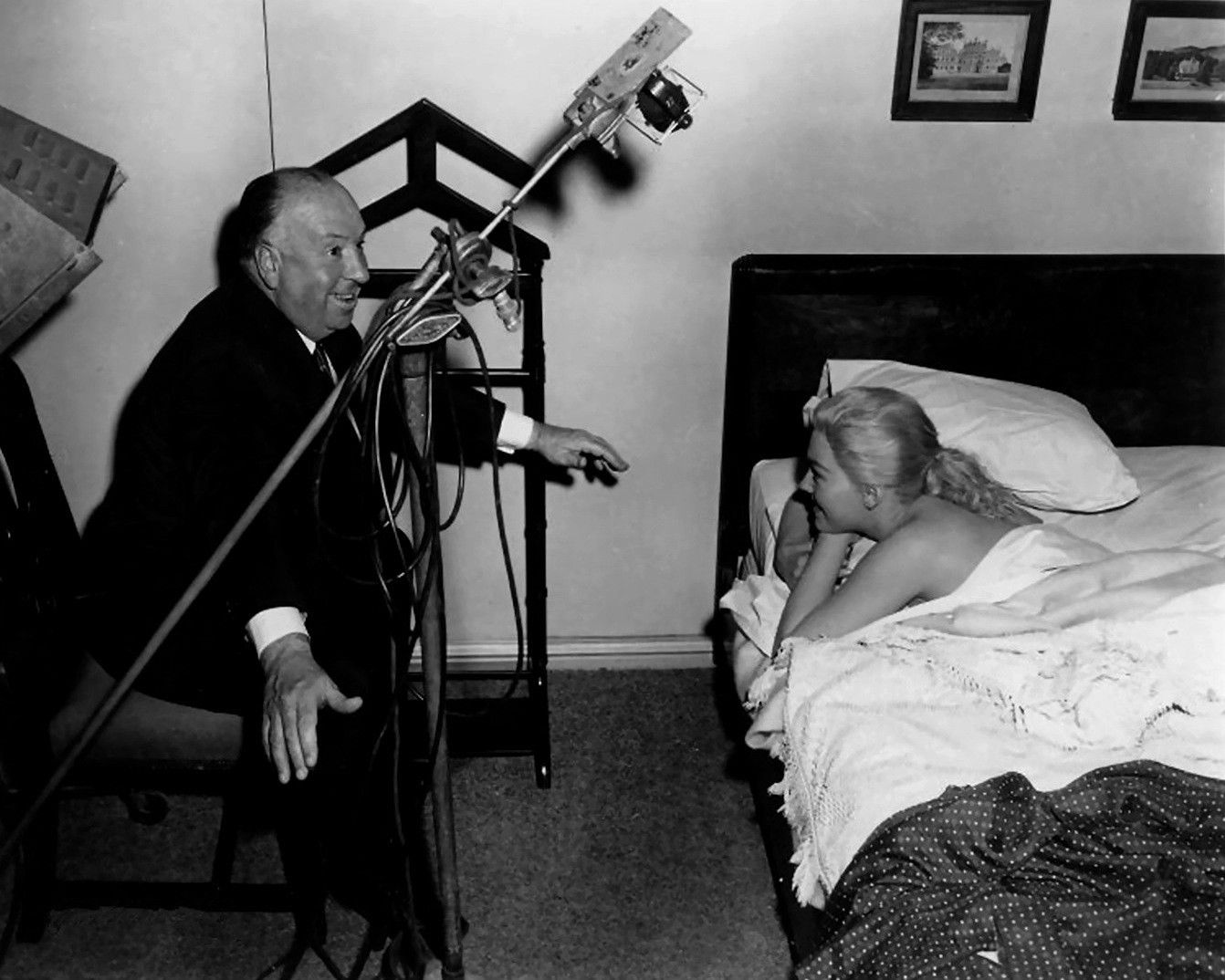 Hitchcock and Novak in Vertigo James Joyce widely utilized the Madonna–whore polarity in his novel A Portrait of the Artist as a Young Man.[13] His protagonist, Stephen Daedalus, sees girls who he admires as ivory towers, and the repression of his sexual feelings for them eventually leads him to solicit a prostitute. This mortal sin drives Stephen's inner conflict and eventual transformation towards the end of the novel. Feminist theory asserts that the Male-Written Culture (MWC) perpetuates patriarchal norms by controlling women's sexual autonomy through shaming, reinforcing gender stereotypes, and allowing men to maintain power.[14] Sexual script theory, as discussed by sociologists William Simon and John Gagnon, suggests that these scripts are primarily authored by heterosexual males, portraying men as sexual pursuers favoring casual sex and women as gatekeepers favoring relational sex.[15] This limits women's sexual autonomy as assertiveness risks slut-shaming and being seen as unfit partners. Additionally, researchers Emily Kane and Mimi Schippers argue that assertive female sexuality threatens male social dominance, as men may fear manipulation, reducing female autonomy to preserve their power.[16] In popular culture The Martin Scorsese films Taxi Driver and Raging Bull feature sexually obsessed protagonists, both played by Robert De Niro, who exhibit the Madonna–whore complex with the women they interact with.[17][18] The David Cronenberg film Spider (2002) focuses on the complex.[19] The singer Madonna played with both identities, especially in her earlier career. Alfred Hitchcock used the Madonna–whore dichotomy as an important mode of representing women.[20] In Vertigo (1958), for example, Kim Novak portrays two women that the hero cannot reconcile: a virtuous, blonde, sophisticated, sexually repressed "madonna" and a dark-haired, single, sensual "fallen woman".[21] |
マ
ドンナ-娼婦コンプレックス 精神分析の文献では、マドンナ-娼婦コンプレックス(マドンナ-愛人コ ンプレックスとも呼ばれる)とは、献身的で愛情深い関係の中で性的興奮を維持できないことである[1]。ジークムント・フロイトが精神的インポテンス [2]という名目で最初に特定したこの心理的コンプレックスは、女性を聖人のようなマドンナか堕落した売春婦のどちらかのように見ている男性に生じると言 われている。この行動的コンプレックスを持つ男性は、堕落した性的パートナー(娼婦)を欲望する一方で、尊敬されるパートナー(マドンナ)を欲望すること ができない[3]。 フロイトは「そのような男性が愛するところでは欲望がなく、欲望するところでは愛することができない」と書いている[4]。 原因 フロイトは、マドンナ・娼婦コンプレックスは、男性の欲望における愛情的な流れと性的な流れの分裂によって引き起こされると主張した[5]。 エディプスと去勢不安の恐怖は、過去の近親相姦の対象に感じる愛情が、官能的に望む女性に執着することを禁止する: 「そのような人の愛の領域全体は、神聖な愛と俗悪な(あるいは動物的な)愛として芸術の中で擬人化された2つの方向に分割されたままである」[5]。不安 を最小限に抑えるために、男性は女性を2つのグループに分類する。精神分析学者のリチャード・トゥチは、フロイトがマドンナ・娼婦コンプレックスについて 少なくとも1つの別の説明を提示したことを示唆している[6]: この以前の理論は、エディプスに基づく去勢不安ではなく、母親の手によって耐え難い欲求不満や自己愛的な傷害を経験させられたという子どもの感覚によって 刺激された、男性の女性に対する第一次的な憎悪に基づいている。この理論によれば、大人になると、少年から男性になった者は、母親の代わりである女性をサ ディスティックに攻撃することで、こうした虐待の復讐をしようとする[6]。 このような分裂は、罹患者が冷たいが過保護な母親[7]に育てられた場合に悪化する可能性があり、感情的な養育の欠如が逆説的に近親相姦的な結びつきを強 めることになる[8]。このような男性は、幼少期に満たされなかった母性的な親密さへの欲求を満たすことを望んで、母性的な資質を持つ人に求愛することが 多いが、ただ、以前の関係にまつわる抑圧された感情が戻ってきて、新しい関係における性的満足を妨げることになる[5]。 別の説では、マドンナ・娼婦コンプレックスは、個々の男性の発達障害というよりも、神話やアブラハム神学におけるマドンナや娼婦としての女性の表象に由来 すると主張する[9]。 歴史  ティツィアーノの『聖と俗の愛』。 ティツィアーノの『聖なる愛と俗なる愛』(1514年。着衣の女性は、花嫁[10][11]や花魁[10][12]の衣装を着ていると言われている。裸婦 は一見、冒涜的な愛の寓意であるように見えるが、20世紀の評価は、彼女の手に香があり、彼女の向こうに教会があることに注目している。  『めまい』のヒッチコックとノヴァク ジェイムズ・ジョイスは『若き日の芸術家の肖像』の中で、マドンナと娼婦の両極を広く利用している[13]。 主人公のスティーヴン・ダイダロスは、憧れの少女たちを象牙の塔のように見ており、彼女たちに対する性的感情を抑圧することで、ついには娼婦を求めるよう になる。この大罪がスティーブンの内面の葛藤を駆り立て、小説の終盤で最終的に変貌を遂げる。 フェミニストの理論では、男性脚本文化(MWC)は、羞恥心によって女性の性的自律性をコントロールし、ジェンダー・ステレオタイプを強化し、男性が権力 を維持できるようにすることで、家父長的規範を永続させていると主張する。 [14]社会学者ウィリアム・サイモンとジョン・ギャグノンによって議論された性的台本理論は、これらの台本が主に異性愛者の男性によって書かれたもので あることを示唆しており、男性はカジュアルなセックスを好む性的追求者であり、女性は関係性のあるセックスを好む門番であると描いている[15]。これ は、自己主張が淫乱な女として辱められ、パートナーとしてふさわしくないとみなされる危険性があるため、女性の性的自律性を制限する。さらに、研究者のエ ミリー・ケインとミミ・シッパーズは、自己主張の強い女性のセクシュアリティは男性の社会的優位性を脅かすと主張している[16]。 大衆文化では マーティン・スコセッシ監督の映画『タクシードライバー』と『レイジング・ブル』では、ロバート・デ・ニーロ演じる性的に取り憑かれた主人公が登場し、彼 らが関わる女性に対してマドンナと娼婦のコンプレックスを示す[17][18]。 デヴィッド・クローネンバーグ監督の映画『スパイダー』(2002年)は、このコンプレックスに焦点を当てている[19]。 アルフレッド・ヒッチコックは、マドンナと娼婦の二項対立を、女性を表現する重要な方法として用いた[20]。 例えば『めまい』(1958年)では、キム・ノヴァクが、主人公が和解できない二人の女性、すなわち貞淑でブロンド、洗練され、性的に抑圧された「マドン ナ」と、黒髪で独身、官能的な「堕落した女」を演じている[21]。 |
| https://en.wikipedia.org/wiki/Madonna%E2%80%93whore_complex |
Madonna–whore complex |
Links
リンク
文献
その他の情報



++
Copyleft, CC, Mitzub'ixi Quq Chi'j, 1996-2099
☆
 ☆
☆